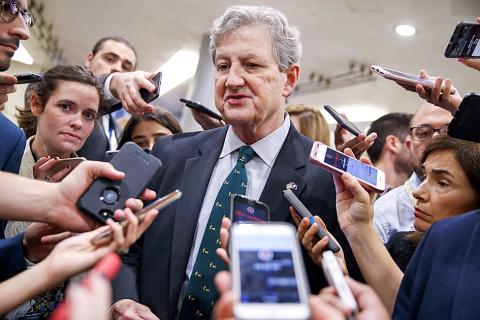Several US congressmen on Friday said that Beijing should be reprimanded for threatening Taipei with military power following Chinese President Xi Jinping’s (習近平) reiteration this week of his goal of unification and willingness to use force to annex Taiwan.
“China threatening Taiwan with military force is reprehensible, counterproductive and just bad diplomacy,” US Senator John Kennedy tweeted.
China’s provocative approach toward Taiwan risks the stability of the region and displays its disrespect of democracies, Kennedy said.

Photo: EPA-EFE
US Representative Mario Diaz-Balart on Twitter called China’s attempts to threaten a democratic US ally “shameful,” saying that communist dictatorships often rely on coercion, threats and violence to maintain power.
“The Chinese people in the PRC [People’s Republic of China] have suffered under crushing oppression for far too long, and the threats against the free people of #Taiwan must end,” said Diaz-Balart, who serves as cochair of the Congressional Taiwan Caucus.
US Representative Steve King said on Facebook that China’s saber-rattling and threats against Taiwan, a democratic ally and an important trading partner, should be condemned by freedom-loving people around the globe.
Taiwan and China are sovereign nations with a right to self-determination, US Representative Paul Gosar said, adding that force should not be an option.
The congressmen were commenting on Xi’s speech in Beijing on Wednesday marking the 40th anniversary of a policy statement that paved the way for cross-strait interactions.
The Chinese leader said that while peaceful unification is his government’s goal, it “makes no promise to abandon the use of force” against the intervention of foreign forces and pro-independence “separatists.”
Xi also said he planned to explore a Taiwan version of the “one country, two systems” model, which President Tsai Ing-wen (蔡英文) in a speech responding to Xi’s remarks later that day said would not be accepted by Taiwanese.
Calling for US support for Taiwan, US Representative Don Bacon on Wednesday tweeted that Taiwan has embraced democracy and human rights for all its citizens.
“America needs to stand by our longstanding commitment to Taiwan and ensure they’re not isolated while China still embraces Communism, and denies freedom of religion, speech, and the press,” Bacon said.
US Representative Vicente Gonzalez also urged the US to stand with Taiwan, which he called a key democratic ally and friend.
Gonzalez and US Representative Andy Biggs expressed the hope that both sides of the Taiwan Strait could return to having peaceful and constructive dialogue and relations.
US Representative Glenn Grothman said China should respect the commitment of the 23 million Taiwanese to freedom and democracy, while US Representative Ted Yoho pledged the US Congress’ “unwavering support” for Taiwan.
“Xi Jinping’s threatening rhetoric on #Taiwan is an escalation of Communist Party campaign to marginalize Taiwan’s democracy,” Yoho said, adding that Taiwan’s legitimacy is a self-evident fact.
The Ministry of Foreign Affairs yesterday thanked the nine US senators and representatives for their staunch, bipartisan support of the nation.

MAKING WAVES: China’s maritime militia could become a nontraditional threat in war, clogging up shipping lanes to prevent US or Japanese intervention, a report said About 1,900 Chinese ships flying flags of convenience and fishing vessels that participated in China’s military exercises around Taiwan last month and in January have been listed for monitoring, Coast Guard Administration (CGA) Deputy Director-General Hsieh Ching-chin (謝慶欽) said yesterday. Following amendments to the Commercial Port Act (商港法) and the Law of Ships (船舶法) last month, the CGA can designate possible berthing areas or deny ports of call for vessels suspected of loitering around areas where undersea cables can be accessed, Oceans Affairs Council Minister Kuan Bi-ling (管碧玲) said. The list of suspected ships, originally 300, had risen to about 1,900 as

DAREDEVIL: Honnold said it had always been a dream of his to climb Taipei 101, while a Netflix producer said the skyscraper was ‘a real icon of this country’ US climber Alex Honnold yesterday took on Taiwan’s tallest building, becoming the first person to scale Taipei 101 without a rope, harness or safety net. Hundreds of spectators gathered at the base of the 101-story skyscraper to watch Honnold, 40, embark on his daredevil feat, which was also broadcast live on Netflix. Dressed in a red T-shirt and yellow custom-made climbing shoes, Honnold swiftly moved up the southeast face of the glass and steel building. At one point, he stepped onto a platform midway up to wave down at fans and onlookers who were taking photos. People watching from inside

Japan’s strategic alliance with the US would collapse if Tokyo were to turn away from a conflict in Taiwan, Japanese Prime Minister Sanae Takaichi said yesterday, but distanced herself from previous comments that suggested a possible military response in such an event. Takaichi expressed her latest views on a nationally broadcast TV program late on Monday, where an opposition party leader criticized her for igniting tensions with China with the earlier remarks. Ties between Japan and China have sunk to the worst level in years after Takaichi said in November that a hypothetical Chinese attack on Taiwan could bring about a Japanese

The WHO ignored early COVID-19 warnings from Taiwan, US Deputy Secretary of Health and Human Services Jim O’Neill said on Friday, as part of justification for Washington withdrawing from the global health body. US Secretary of State Marco Rubio on Thursday said that the US was pulling out of the UN agency, as it failed to fulfill its responsibilities during the COVID-19 pandemic. The WHO “ignored early COVID warnings from Taiwan in 2019 by pretending Taiwan did not exist, O’Neill wrote on X on Friday, Taiwan time. “It ignored rigorous science and promoted lockdowns.” The US will “continue international coordination on infectious